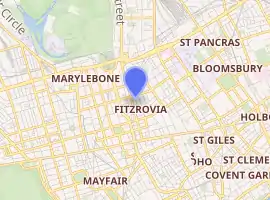Advision Studios
Advision Studios was a recording studio in Fitzrovia, central London, England.[2]
| Advision Studios | |
|---|---|

| |
| General information | |
| Address | 23 Gosfield Street, W1W 6HG[1] |
| Town or city | Central London |
| Country | United Kingdom |
| Coordinates | 51°31′11″N 0°8′31″W |
Origins
Founded in the 1960s by Guy Whetstone and Stephen Appleby,[1] Advision originally provided voiceovers and jingles for television advertisements. The studio was initially located at 83 New Bond Street, but moved to 23 Gosfield Street in 1969.[1][3] The studio complex was built to be able to house a 60-piece studio orchestra and had a 35mm film projector screen for synchronizing with motion picture images.[2] Producer Martin Rushent began his career as a projectionist at Advision.[4]
History
By the mid-1960s, Advision had become one of the top London studios for rock and pop music. The Yardbirds recorded their 1966 album Roger the Engineer at Advision on a 4-track machine. The Move recorded some of their early hits at Advision, engineered by Gerald Chevin, including Flowers in the Rain in July 1967.[5] In early 1968, Advision became the first studio in the UK to obtain a professional 8-track machine, which was built in the United States by Scully Recording Instruments. Among the first artists to use the 8-track machine were T. Rex, The Who, and Caravan. In 1970, the studio used a custom 24-channel desk with an 8-track recorder.[1][2] Advision was also among the first studios in the UK to install 16- and 24-track recorders in the early 1970s.[6] The Natural Acoustic Band recorded "Learning to Live" there in 1971, produced by Milt Okun.
In 1971, a 20-channel Neve console was added to the mixdown suite.[1] During the 1970s the studios' focus moved toward Progressive rock music, and the company began producing music for bands such as Yes, Gentle Giant, Emerson, Lake & Palmer and Premiata Forneria Marconi, as well as Jeff Wayne's Musical Version of The War of the Worlds.[2]
A 1974 re-fitting gave the studio a console built in California by Quad-Eight Electronics for quadraphonic mixing, and the UK's first computer-aided mixdown desk.[2][7] Producers and engineers to have worked at Advision include Eddy Offord,[8] Eddie Kramer,[9] Martin Rushent,[4] Paul Northfield,[10] and Hugh Padgham.[11]
The Gosfield Street location has been occupied since 1993 by a studio called The Sound Company.
Partial discography
The following is a partial list of work either recorded, mixed or mastered at Advision Studios between 1966 and 1986, taken from .
| Artist | Title |
|---|---|
| Alexis Korner | Just Easy (1978) |
| David Bowie | The Man Who Sold the World (1970) |
| Buzzcocks | Love Bites (1978) |
| Cat Stevens | Back to Earth (1978) |
| David Essex | Rock On (1973) |
| Emerson, Lake & Palmer | Tarkus (1971), Brain Salad Surgery (1973) |
| Elton John | Caribou (1974) |
| Gentle Giant | The Power and the Glory (1974) |
| Jeff Wayne | The War of the Worlds (1978) |
| John Mayall | Empty Rooms (1969) |
| John's Children | Orgasm (1970) |
| Kate Bush | The Dreaming (1982) |
| Mott the Hoople | The Hoople (1974) |
| The Move | Shazam (1970) |
| Osibisa | Osibisa (1971) |
| Pet Shop Boys | Please (1986) |
| Public Image Ltd | Public Image: First Issue (1978) |
| Queen | Flash Gordon (1980) |
| Slade | Whatever Happened to Slade (1977) |
| Soft Machine | Fifth (1972) |
| T.Rex | My People Were Fair (1968) |
| Yardbirds | Roger the Engineer (1966) |
| Yes | The Yes Album (1971), Close To The Edge (1972) |
| Rory Gallagher | Rory Gallagher (1971) |
| Gerry Rafferty | City to City (1978) |
References
- Burns, Phil (2011). "Advision Studios". Classic UK Recording Studios in the 60s & 70s. Archived from the original on 16 October 2011. Retrieved 9 October 2011.
- Brain Salad Surgery (2006). "Advision Studios". Retrieved 9 October 2011.
- Discogs – Advision Studios – (profile and discography)
- The Telegraph (7 June 2011). "Martin Rushent". The Daily Telegraph. London. Retrieved 7 June 2011.
- "Move Remaster Series – Move – Tracklisting". Ftmusic.com. Retrieved 2012-12-04.
- "Veale Associates – Professional Sound Studio Design". Vealea.com. Retrieved 2012-12-04.
- Robertshaw, Nick (1979). "Stiff Competition Marks U.K. Scene". Billboard. 91 (22): ES-3. ISSN 0006-2510. Retrieved 9 October 2011.
- Welch, Chris (1999). Close to the Edge – The Story of Yes. London: Music Sales Group. p. 123. ISBN 0-85712-042-5.
- Owsinski, Bobby (2004). The Recording Engineer's Handbook. Milwaukee, WI: Hal Leonard. p. 321. ISBN 1-932929-00-2.
- "Paul Northfield (Producer) 2013 Interview on the Signals of Intuition". The Signals of Intuition. 99.1 CJAM-FM. 2013-08-27. Retrieved 2013-08-28.
- Verna, Paul (1997). "HP Off the Record". Billboard: HP-13. ISSN 0006-2510. Retrieved 9 October 2011.